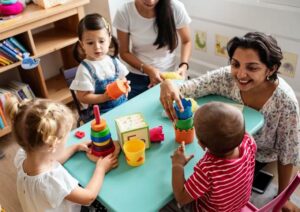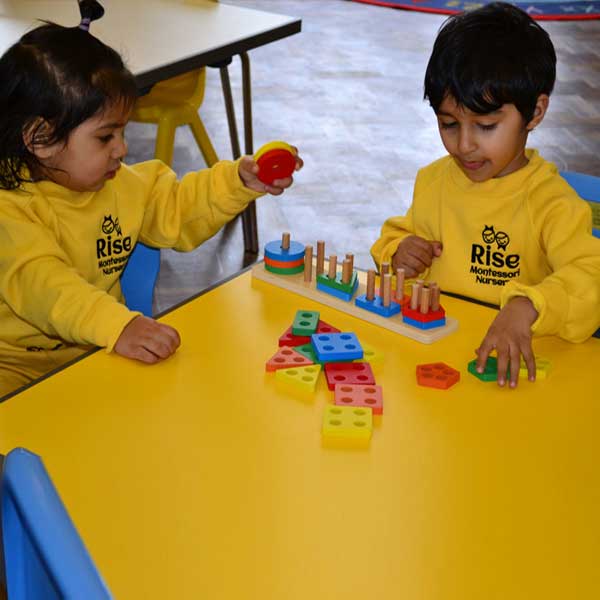Montessori childcare is an educational approach that emphasizes hands-on learning and encourages children’s curiosity and exploration. Founded by Maria Montessori in the early 1900s, the Montessori method has been widely adopted in early childhood education around the world. The Montessori philosophy is based on the belief that children learn best when they are actively engaged in the learning process, and when they are given the freedom to explore and discover at their own pace.
One of the key features of Montessori childcare is the use of hands-on materials. Montessori materials are designed to be self-correcting, meaning that children can see for themselves when they have made a mistake and can correct it without the need for adult intervention. For example, the Montessori “pink tower” is a set of ten pink cubes that vary in size from 1 cm to 10 cm. Children can use these cubes to build towers of increasing size, developing their spatial awareness and fine motor skills as they go.
Another example of a Montessori material is the “golden beads,” which are used to teach children about place value and the decimal system. Each bead represents a unit, and as children move from units to tens to hundreds and beyond, they begin to understand the concept of place value and the relationship between numbers.
By providing children with these hands-on materials, Montessori childcare promotes active learning and allows children to explore and discover for themselves. This approach helps to develop children’s problem-solving skills and encourages them to think creatively.
In addition to the use of hands-on materials, Montessori childcare also encourages curiosity and exploration. Montessori classrooms are designed to be child-centered, with teachers acting as guides rather than lecturers. Children are free to choose their own activities and to work at their own pace, giving them a sense of autonomy and control over their learning.
This approach fosters a sense of curiosity and encourages children to ask questions and seek out answers for themselves. Montessori teachers are trained to observe children closely and to tailor their teaching to each child’s individual needs, strengths, and interests. This helps to ensure that each child is challenged and engaged in their learning, and that they are able to develop their natural curiosity and love of learning.
Montessori childcare also emphasizes the importance of the environment in promoting learning and exploration. Montessori classrooms are carefully designed to be calm, peaceful, and orderly, with a focus on natural materials and a minimalist aesthetic. This creates a sense of harmony and balance, which can help children to feel safe and secure as they explore and learn.
In addition, Montessori classrooms are designed to be sensory-rich, with a wide range of textures, colors, and sounds to stimulate children’s senses and encourage exploration. For example, Montessori classrooms often include a “sensorial area” where children can explore materials such as sandpaper, fabrics, and water, developing their sense of touch, sight, and sound in the process.
In conclusion, Montessori childcare promotes hands-on learning and encourages curiosity and exploration by providing children with hands-on materials, fostering a child-centered approach to teaching, and creating a calm and sensory-rich environment. By allowing children to explore and discover for themselves, the Montessori approach helps to develop problem-solving skills, creativity, and a love of learning that can last a lifetime.

